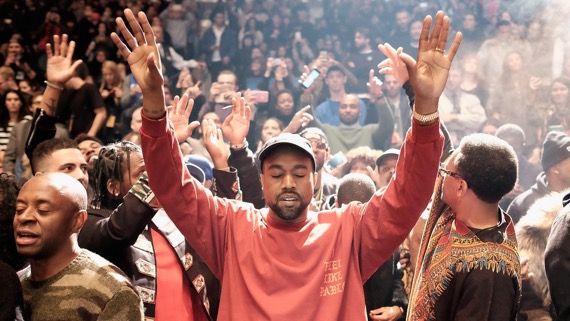The Gospel of Rap

Hip-hop and religion are intrinsically linked. Far from the all-too-common perception of hip-hop as being tied purely into drugs and violence, hip-hop has acted as a reflection of the culture and artists that create it since the first time a track was spun in the Bronx in the 70’s. In the four decades since, woven throughout hip-hop are religious threads that are becoming more and more evident each day. We wrote about it in our article on preconceptions against religious rap last year, but we did not examine the root of it, where this new trend came from.
At its surface, it is simple enough: religion plays a huge role in African-American communities, but for a long time, this religious, primarily Christian, inclination was not surfaced in the same way. Now, due to changing trends and social attitudes both within the country and the hip-hop community, we are seeing a rise in the prevalence of religious imagery, lyrics, and iconography in rap.
Like many trends in modern hip-hop, it started with Kanye West. Today, hip-hop is a much different genre than it was ten or fifteen years ago. Far from its more rugged origins, hip-hop has gone mainstream. This is due in large part to the critical and commercial successes of Kanye’s Graduation and later 808’s and Heartbreak. Throughout its history, religion, especially Judeo-Christian religions, have been a large part of rap, but in the last few years, we have experienced a shift in the way in which religion is used in rap music. Religion is becoming a topic of songs and albums, crucial parts of an artist’s message outside of the Christian music genre.
In an environment as turbulent as the one which gave birth to rap, it is no surprise to see prayers and messages to God woven into lyrics. Combined with the fact that an overwhelming majority of black Americans (87%) are religious, and almost as many (79%) count religion as being “very important in their life”, (Pew U.S Religious Landscape Survey) it is no surprise that the subject matter consistently comes up. In a world of systemic oppression and violence, turning to a higher power as a respite fits with the way religion was used in rap music for a long time. Prayers for safety, “please Lord don’t let me go to jail tonight” (Akon - Soul Survivor), or the struggle of their purpose or identity, “Heavenly Father, hear a nigga down here / Before I go to sleep / Tell me, who do you believe in?” (2Pac - Who Do You Believe In)
Compare that with contemporary religious rap, which seems more like a celebration of one’s individual experiences with faith. Talking about happiness, joy, faith, love, and other couple emotions in mainstream rap is a newer phenomenon. After Kanye changed the game, mainstream rap softened its rough edges and broadened its subject matter. It went from gangsta rap being the dominant force in rap to a much more emotionally focused genre of music in the span of a few short years. Look at “Blessings,” Chance the Rapper’s love song to God and his daughter from last year’s Coloring Book.
I don't make songs for free, I make 'em for freedom
Don't believe in kings, believe in the Kingdom
Chisel me into stone, prayer whistle me into song air
Dying laughing with Krillin saying something 'bout blonde hair
Jesus' black life ain't matter, I know I talked to his daddy
Said “you the man of the house now, look out for your family”
He has ordered my steps, gave me a sword with a crest
And gave Donnie a trumpet in case I get shortness of breath
(Chance the Rapper - Blessings)
It is a song about Chance’s relationship with God, and this kind of tenderness and devotion is emblematic of the new age of rap we live in. The idea of giving oneself up to God, giving your life over to them, is central to the idea of many religions. But it is also the shift of focus away from the self that is remarkable. Where once prayers were said for safety before giving themselves up for dead, now rappers spit prayers while giving themselves up to God.
Lord God
I come to you a sinner
And I humbly repent for my sins
I believe that Jesus is Lord
I believe that you raised him from the dead
I will ask that Jesus will come to my life
And be my Lord and Savior
I receive Jesus to take control of my life
And that I may live for him from this day forth
Thank you Lord Jesus for saving me with your precious blood
In Jesus' name, Amen
(Kendrick Lamar - Sherane a.k.a Master Splinter’s Daughter)
This humility is part of the new rap that Kanye helped start, as odd as it sounds. Challenging the status quo, songs about the self and the artist’s feelings and experiences started to gain wide consumer appeal. Songs about fragility, fear, doubt and imperfection that tied directly into an artist’s relationship with God.
God show me the way because the Devil's tryna break me down
(Jesus walk with me)
The only thing that I pray is that my feet don't fail me now
(Jesus walk)
And I don't think there's nothin' I can do now to right my wrongs
(Jesus walk with me)
I wanna talk to God but I'm afraid cause we ain't spoke in so long
(Kanye West - Jesus Walks)
As our society evolves, so does our music, and we have come a long way in the last ten years in terms of what we consider normal. The hyper-masculine, violent, and sexualized world of gangsta rap is one that dominated for three decades and during that time, some amazing music was created.In this last decade, however, our society has experienced a cultural upheaval. We are moving away from that image and towards a broader one that encompasses more people and their experiences. And a large part of the American experience, especially the black American experience, is tied to religion.
Artists are taking steps to embrace this everyday, sharing the personal conversation they have with their God with people across the world. To open themselves up in new and vulnerable ways. As we move forward, this will only continue. Chance just won a Grammy for Coloring Book, and its heavily religious themes are even more emphasized than most in mainstream rap. As this expression becomes both accepted and lauded, more artists will be willing to follow down the same path.
We strive to see every side of the issue, but at the same time, acknowledge that given our backgrounds, the views and opinions we carry might be different from others. If we missed something due to our inherent biases based off of our positions, we would love to discuss it further with you in the comments below, and we always appreciate any feedback you might have for us. Feel free to email us at contact@deathofthecritic.com
_____________________________________________

Tom has been writing about media since he was a senior in high school. He likes long walks on the beach, dark liquor, and when characters reload guns in action movies.
You Might Also Like:
LGBTQ Hip Hop: The Tantalizing Problem of LabelingWhen Black is not Black Enough - Drake and Coding in Hip-Hop
I Miss the Old Kanye
_____________________________________________